
Title: The Infant's Delight: Poetry
Author: Anonymous
Release date: February 1, 2004 [eBook #10912]
Most recently updated: December 23, 2020
Language: English
Credits: Produced by Afra Ullah and the Online Distributed Proofreading Team

| When the win-ter winds are blow-ing, And we ga-ther glad and gay, Where the fire its light is throw-ing, For a mer-ry game at play, There is none that to my know-ing,— And I've play-ed at games enough,— Makes us laugh, and sets us glow-ing Like a game at Blind-man's Buff. |
|
All through the win-ter, long and cold, Dear Minnie ev-ery morn-ing fed The little spar-rows, pert and bold, And ro-bins, with their breasts so red. She lov-ed to see the lit-tle birds Come flut-ter-ing to the win-dow pane, In answer to the gen-tle words With which she scat-ter-ed crumbs and grain. One ro-bin, bol-der than the rest, Would perch up-on her fin-ger fair, And this of all she lov-ed the best, And daily fed with ten-der-est care. But one sad morn, when Minnie came, Her pre-ci-ous lit-tle pet she found, Not hop-ping, when she call-ed his name, But ly-ing dead up-on the ground. |
|
God's works are very great, but still His hands do not ap-pear: Though hea-ven and earth o-bey His will, His voice we can-not hear. And yet we know that it is He Who moves and governs all, Who stills the rag-ing of the sea, And makes the showers to fall. Alike in mer-cy He be-stows The sun-shine and the rain; That which is best for us He knows, And we must not com-plain, Whe-ther He makes His winds to blow, And gives His tem-pests birth, Or sends His frost, or bids the snow— "Be thou up-on the earth." |


|
See these mer-ry ones at play, On this snowy New Year's Day: How they run, and jump, and throw Hand-fuls of the soft, white snow. You should hear them laugh and shout As they fling the snow about! 'Tis by Frank and Gus alone That the balls are chief-ly thrown, While their cou-sins make and bring Other balls for them to fling. Ka-tie is pre-par-ing thus, Quite a store of balls for Gus; But her mer-ry sis-ter May From her task has run a-way, All that heavy lump of snow, At her cou-sin Gus to throw. E-dith is not very bold, And at first she fear-ed the cold; Now at last you see her run Down the steps to join the fun. |
|
Oh! is there any cause to fear That dol-ly will be very ill? To cure my lit-tle dar-ling here, Pray, doc-tor, use your ut-most skill. And dol-ly, if you would get well, Hold out your arm, that Dr. Gray May feel your tiny pulse, and tell What best will take the pain a-way. And do not say: "I will not touch That nas-ty phy-sic, nor the pill." If lit-tle dolls will eat too much, They must not won-der if they're ill. If your mam-ma ate too much cake, She would be very poor-ly too, And nas-ty phy-sic have to take; And, lit-tle dol-ly, so must you. |



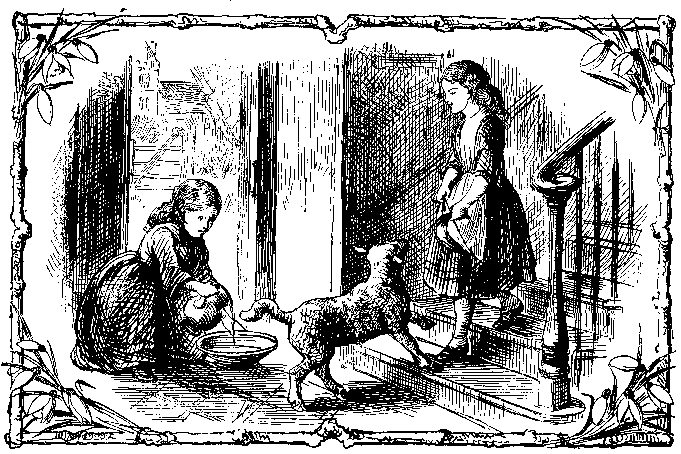
|
This lit-tle Lamb was brought to Nell The day its old ewe mo-ther died, And, now it knows and loves her well, It will not go from Nel-ly's side. A-long the hall, and up the stair, You hear its lit-tle pat-ter-ing toes: Her Pet will fol-low every-where A-bout the house, where Nel-ly goes. |
ROSE. The post-man has been, dear mam-ma, And has brought me a let-ter so fine; And Su-san has one, but it is not, by far, So pret-ty a let-ter as mine. And, pray, will you read it to me, Mam-ma, if I give you a kiss? I wish very much to know who it can be That has sent me a let-ter like this.
MAM-MA.
To the lot of our dear lit-tle RoseWe trust every bless-ing may fall; And this is the prayer and the fond hope of those Who love her most dear-ly of all. So now, lit-tle Rose, can you guess Who sent you this let-ter by post? ROSE.
Oh, yes, dear mam-ma, I can tell you; oh, yes!For you, and pa-pa, love me most. |
|
God loves His lit-tle birds; for all His ten-der care He shows; A sin-gle spar-row can-not fall But its Cre-a-tor knows. They do not sow, nor reap the corn, Gar-ner nor barn have they; God gives them break-fast every morn, And feeds them through the day. And this we know; for in His Word, Where all His ways we read, We find that eve-ry lit-tle bird He cares for, and will feed. God loves each lit-tle bird; but still More ten-der is His care For chil-dren who o-bey His will, Than for the fowls of air. |


|
The lit-tle birds by God are fed But man must earn his dai-ly bread, And work that he may eat; Striv-ing his best, as John does now, The broad ten-acre field to plough, Where-in to sow the wheat. Old John, the plough-man, ne'er re-pines, Whe-ther it blows, or rains, or shines, But hap-py still does seem; And Dick, who leads the fore-most horse, Goes whist-ling as he walks across The field be-side the team. Let us per-form as glad-ly, too, The work our Mas-ter bids us do, And then we need not fear; But when from earth-ly toil we rest, We all shall meet a-mong the blest Who served Him tru-ly here. |
|
Cold win-ter has come, And the cru-el winds blow— The trees are all leaf-less and brown; These two pret-ty rob-ins, Oh, where shall they go To shel-ter their lit-tle brown heads from the snow? Just look at the flakes com-ing down. But see, they have found a snug shel-ter at last, And hark, how they talk, while the storm whis-tles past: Says Pol-ly to Dick-y, "You're near-est the door, And you are the gen-tle-man, too: Just peep out and see When the storm will be o'er; Be-cause, if the wea-ther's as bad as be-fore, I think we will stay, do not you?" |
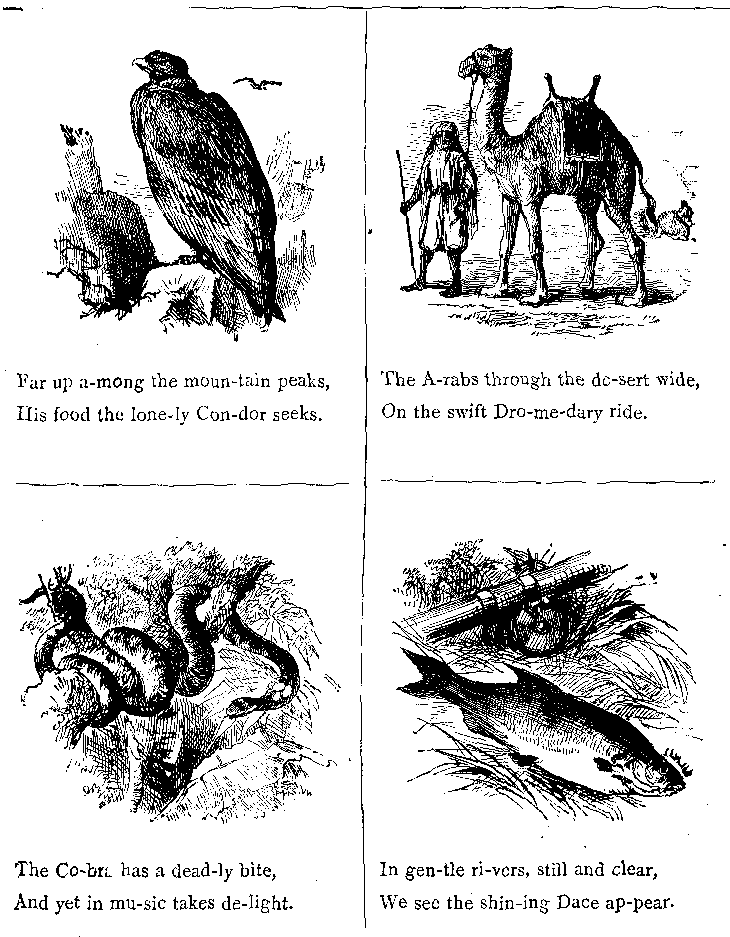


|
"No, Nel-ly! not to-day, my child! I can-not let you take it; This cold March wind, so strong and wild, Your pa-ra-sol, 'twould break it!" So said Mam-ma; but Nel-ly thought, "I will take my new pre-sent: Tis mine; to please me it was bought; The wea-ther's bright and plea-sant." So naugh-ty Nel-ly sli-ly took What kind Mam-ma had bought her, And out she went—and, only look! The wild March wind has caught her! The silk tore up, the ribs broke out, In spite of Nel-ly's sway-ing; And peo-ple laugh-ed at her, no doubt— That comes of dis-o-bey-ing. |
(SONG OF SOLOMON, ii. 12.) Now the win-ter cold is past, And blithe March winds are blow-ing, In shel-ter-ed nooks we find at last Bright flow-ers of spring are grow-ing. Along the hedge-row's mossy bank, Where ivy green is creep-ing, We see through weeds and net-tles rank The dark-blue vi-o-let peep-ing. And in the sun-ny gar-den beds Gay a-co-nites are show-ing, And snow-drops bend their grace-ful heads, And cro-cus-es are glow-ing. God makes the buds and leaves un-fold, All flow-ers are of His giv-ing; He guards them through the win-ter's cold, He cares for all things liv-ing. |
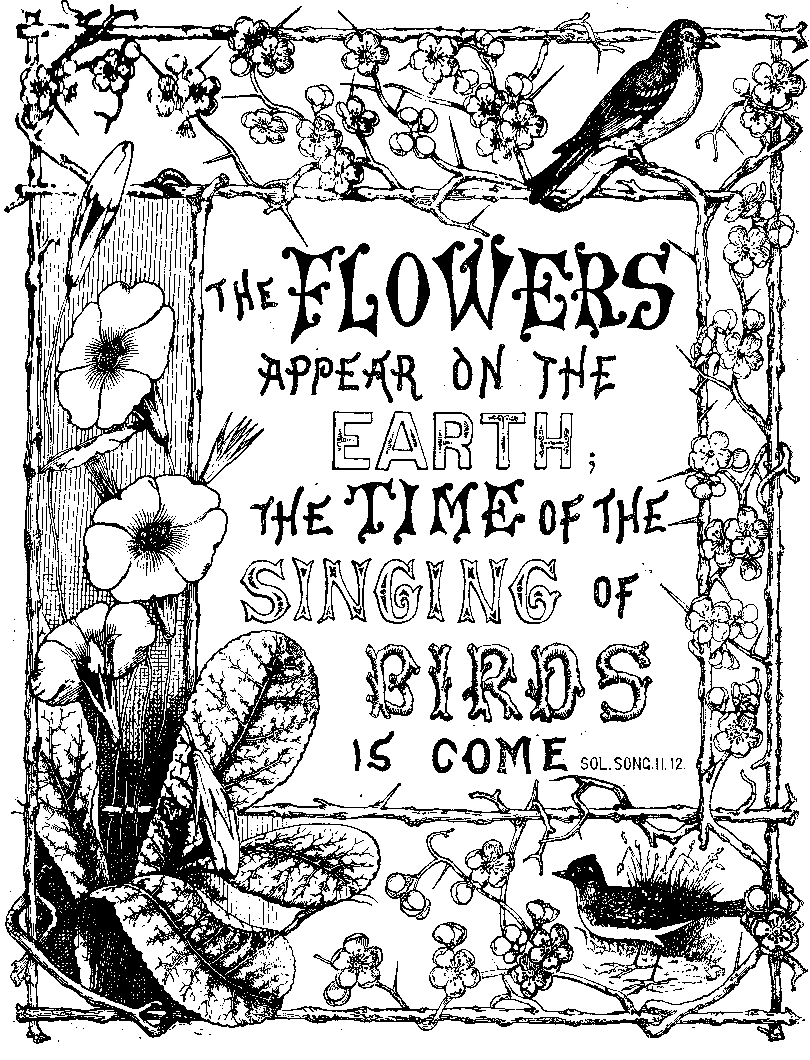
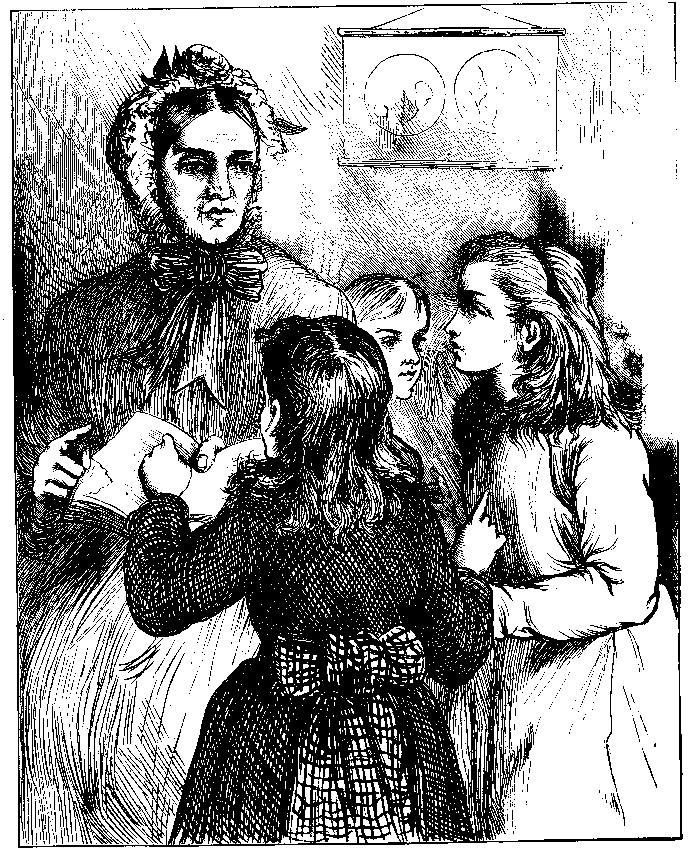
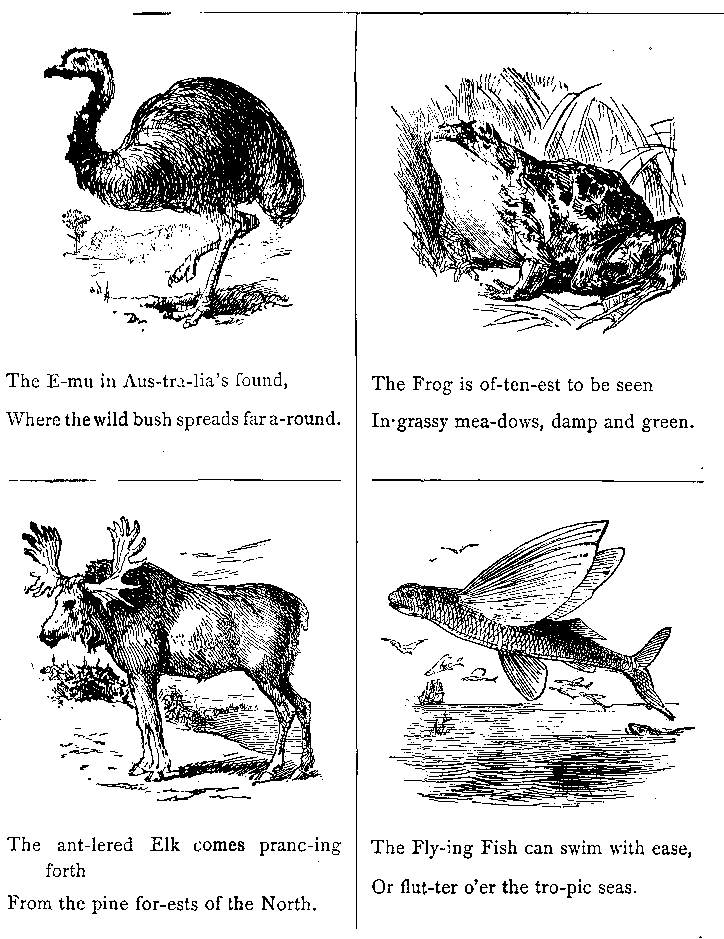


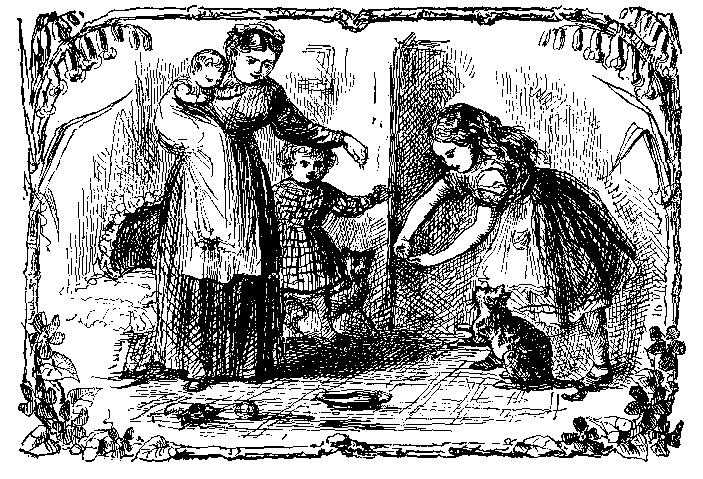
| Pus-sy, jump! for all the day You have time e-nough to play; Though at night, in barn and house, You must watch for rat or mouse. Pus-sy, jump! and if you do, We will pour some milk for you; Pus-sy, you shall be ca-ressed, If you try and jump your best. |
|
Har-ry and Tom, the o-ther day, Went out in-to the yard to play; Their great de-light, in wea-ther bright, Is blow-ing bub-bles with pipes of clay. Tom took a ba-sin deep and wide, And Har-ry brought his mug be-side; They fil-led them quite with soap-suds white, And each to blow the big-gest tried. Poor Tom, he blew with might and main, And so, of course, he blew in vain; For all his trou-ble he made no bub-ble, But Tom was brave and tried a-gain. Till Har-ry said, "Dear Tom, you see, You blow too hard; now—look at me. There! that will rise to-ward the skies, And float a-bove the li-lac tree." |
| When A-pril skies be-gin to frown, And the cold rain comes pelt-ing down, We must not grum-ble nor com-plain, Nor i-dly say, we hate the rain. God sends the rain; the dust-y ground It soft-ens in the fields a-round; The mois-ture ev-e-ry plant re-ceives, And springs a-fresh in flow-ers and leaves. Should God for-bid the show-ers to fall, Nor send us any rain at all, The ground would all grow hard and dry, And ev-e-ry liv-ing plant would die. All things would starve and per-ish then— No food for birds, nor beasts, nor men; Then do not mur-mur, nor com-plain, God, in His good-ness, sends the rain. |
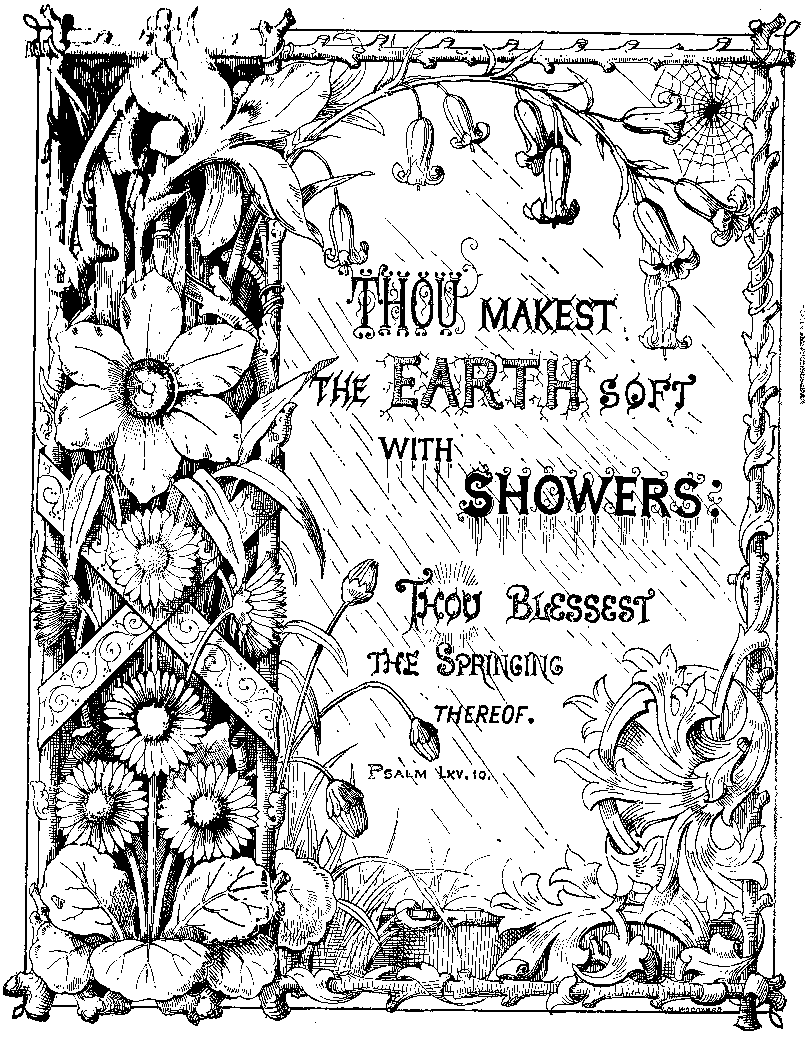
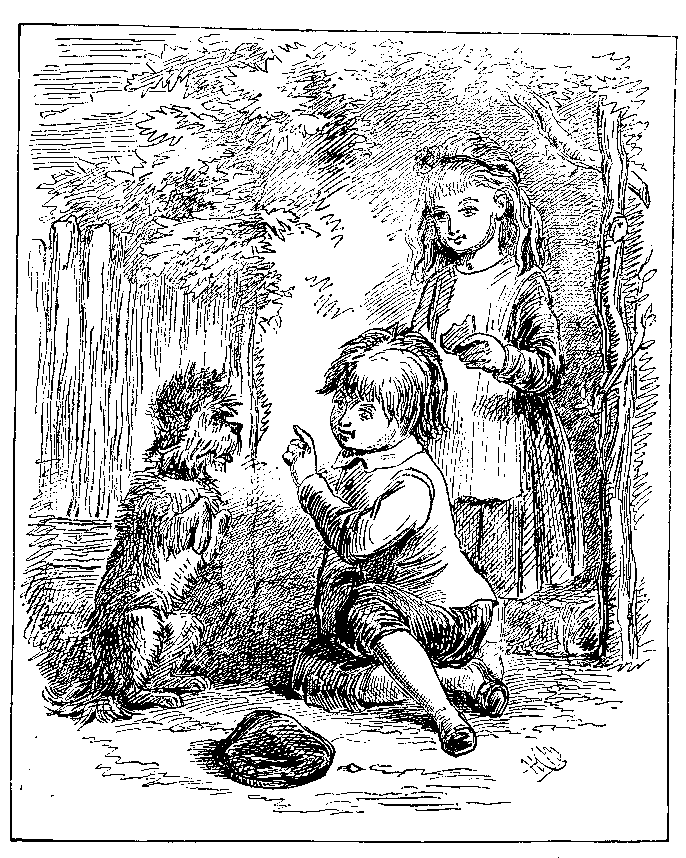
|
"Dear lit-tle Snap, you fun-ny pup, I love to see you beg, So cle-ver-ly do you sit up And bend each slen-der leg, Drop-ping the paw; And raise your ears a-bove your head, Look-ing so very wise; You seem to know I have some bread; And then, such bright green eyes I never saw. "Your shag-gy coat is long and rough, Your tail is rough-er still; Now, Snap, I think you've had e-nough, And more would make you ill— In-deed it would. But sis-ter Lot-ty has some cake, And so if you will sit Quite still and good, till I say 'Take!' Then you shall have a bit; So, Snap, be good!" |
|
"Come, Kit-ty, come; you need not fear, Nor make that plain-tive mew; Don't be a-fraid, but ven-ture near, And lap the milk we bring you here, For none will in-jure you. "And, Kit-ty, since you've lost your way, You need no fur-ther roam; But stop, and dine with us to-day, And then, if you would wish to stay, Poor Kit-ty, here's your home. "And we will feed you fine and fat, On fresh new milk and nice; And, when you grow to be a cat, You can re-quite us well for that, By catch-ing all the mice." |



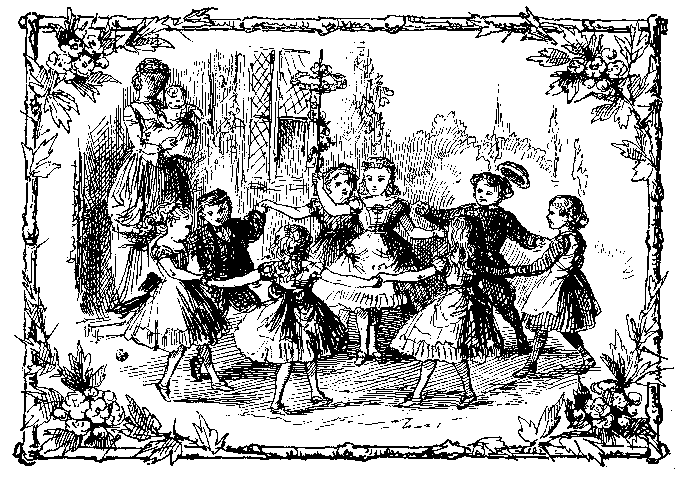
|
Round the May-pole, on the grass, Mer-ry lit-tle foot-steps pass; In the mid-dle Bes-sie stands, With the May-pole in her hands; While her play-mates dance and sing Round her in an end-less ring. Soon, in-deed, a feast they'll make, Cow-slip tea, with nice plum-cake— And so our leave of them we'll take. |
|
The haw-thorn blos-som, snow-y white, Hangs thick upon the hedge to-day; With many flow-ers the fields are bright Upon this mer-ry First of May. So let us ga-ther flow-er-ets fair, And blos-soms from the haw-thorn spray, To deck our May-pole stand-ing there, Upon this mer-ry First of May. And then, like fai-ries, in a ring, A-round it we will dance or play, And all our glad-dest songs will sing Upon this mer-ry First of May. And dear-est Maud shall there be seen With crown of haw-thorn blos-soms gay, And she shall be our lit-tle queen, Upon this mer-ry First of May. |
|
See how na-ture now re-joices In this sun-ny month of May; Still to God from all its voices Giv-ing prais-es day by day. In the glad green wood-land al-leys Ev-e-ry bird its an-them trills! While flocks feed-ing in the val-leys, Herds up-on a thou-sand hills, Join with ev-ery crea-ture liv-ing, Here on land, in air, or sea, In one great world-wide thanks-giv-ing, Yield-ing praise, O God, to Thee! All a-round us swells the cho-rus From this good-ly world of ours, And earth's al-tar stands be-fore us Sweet with in-cense from her flow-ers. So, with Na-ture still con-fess-ing His great good-ness, let us pay Grate-ful hom-age for each bless-ing Of this sun-ny month of May. |

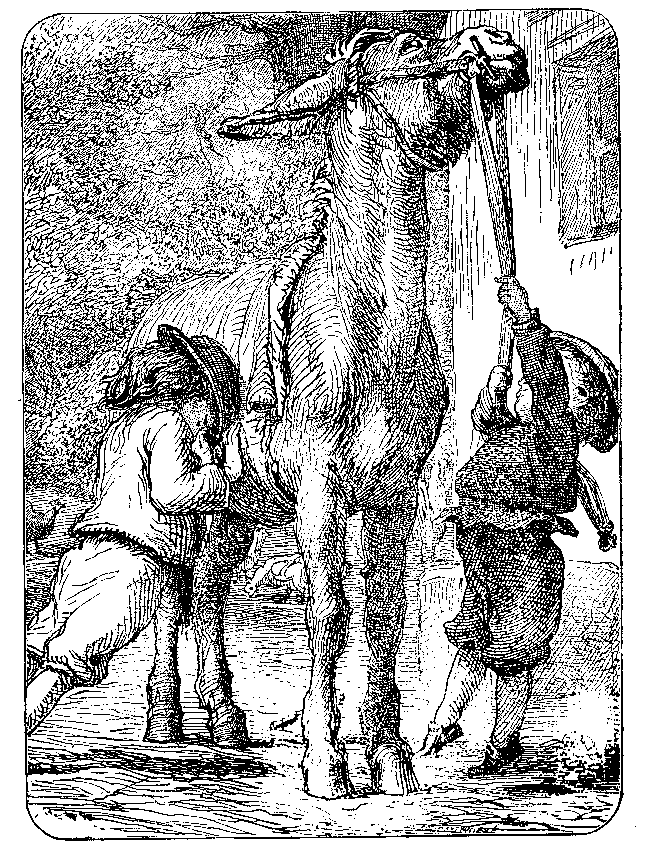

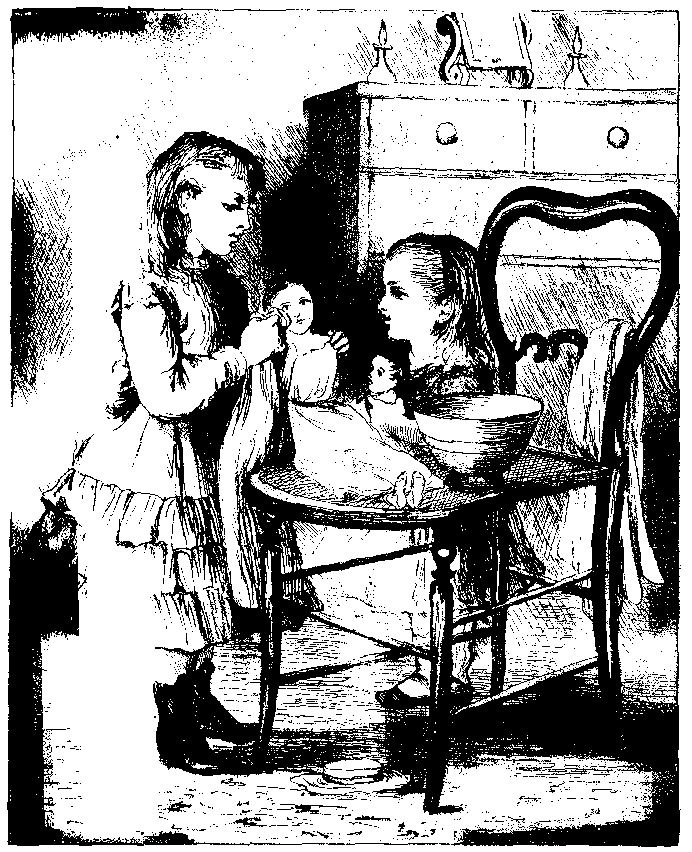

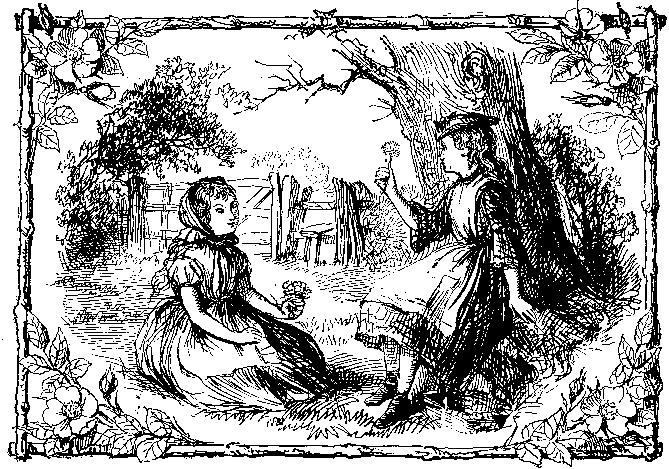
| The dan-de-lion blos-soms gay From the fields have passed away, And in their place left heads of grey. Now, Min-nie, won't it be good fun For each of us to ga-ther one, And sit and blow them in the sun? Very hard we both must blow, And scat-ter all the seeds like snow, That will be 'one o'clock,' you know." |
| Lit-tle, help-less ba-by dear, While with-in your cot you lie, Sis-ter May is sit-ting near— She will sing your lul-la-by. When at last you fall a-sleep, Not the slight-est noise she'll make; Quiet as a mouse she'll keep, Lest she should her dar-ling wake. May will watch you well, for though She can play and prat-tle too, 'Tis not very long ago Since she was a babe like you. Then mam-ma o'er lit-tle May Day and night her watch would keep; May her care can now re-pay, Watch-ing ba-by whilst a-sleep. |
|
Be-hold the flow-ers of June! how fair And bright their buds ap-pear, As, open-ing to the sum-mer air, Our eyes and hearts they cheer! Who would have thought there could a-bound Such beau-ty and de-light Be-neath the cold and win-try ground That hid those flow-ers from sight? That pow-er which made and governs all— The might-y pow-er of God— A-lone could life and beau-ty call Out of the life-less sod. And He, who from the Win-ter's gloom Can Sum-mer thus dis-close, Shall one day make the de-sert bloom, And blos-som as the rose. |
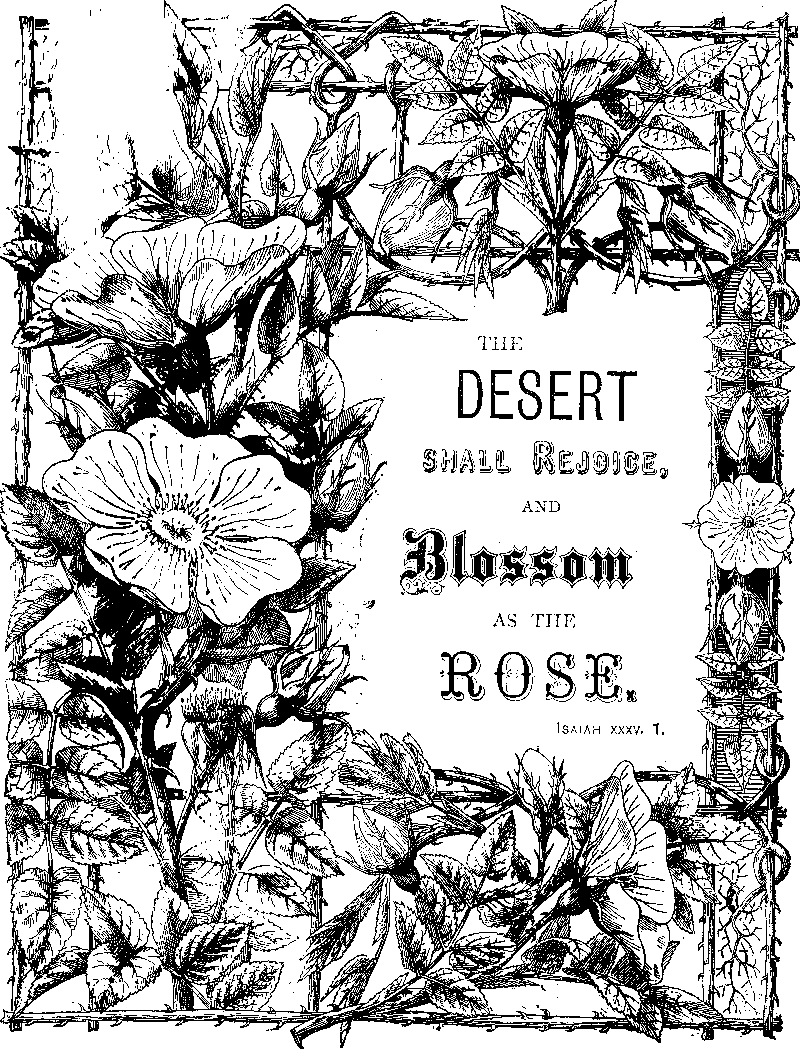
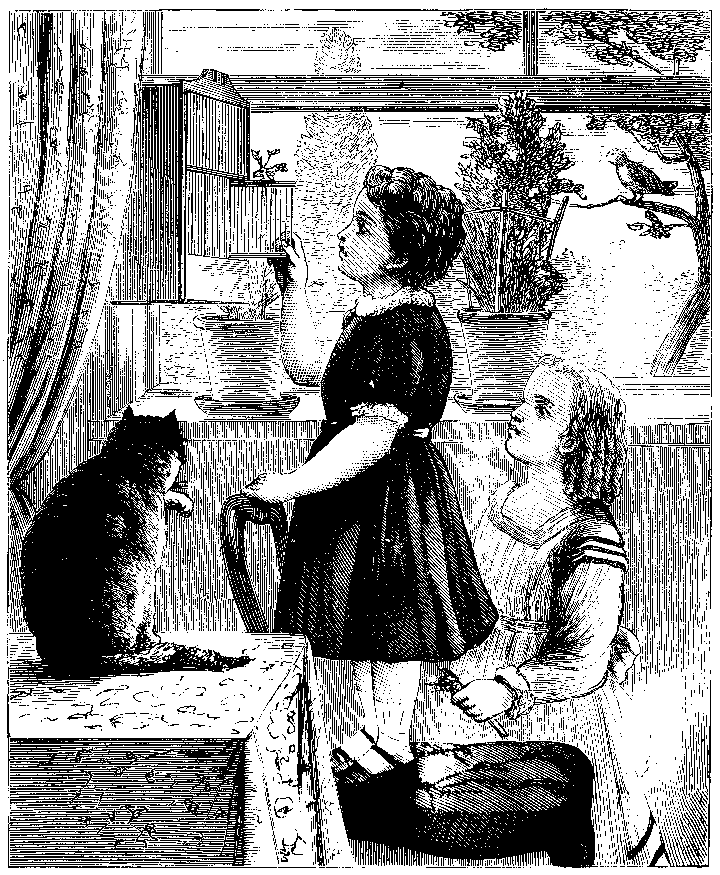
| "Look there!" lit-tle Lot-ty cried, "Dick-ey's cage is o-pen wide, And, I fear, he's not in-side. Cou-sin John, Do please stand up-on this chair, Just to see if he is there. Pret-ty Dick, I won-der where You are gone! "Naugh-ty puss, your jaws, you lick! Have you eat-en lit-tle Dick? That would be a cru-el trick! No, I see Pret-ty Dick has flown a-way, And is sing-ing blithe and gay, Sit-ting yon-der on a spray Of the tree. "Well, I too should think it wrong, If a gi-ant, tall and strong, Just to hear my lit-tle song ev-ery day, Shut me in a cage; and yet Thus I did my lit-tle pet— So he must be glad to get Safe a-way." |
|
Says Hu-bert, "Look, how fast it pours! I'm sure we can't go out of doors While it is rain-ing thus; So let us in the nur-se-ry stay, To have a mer-ry game, and play At driv-ing om-ni-bus. "Flo-ra and Ted-dy, you must be The horses, and be driv-en by me. Mind you go stea-dy—do! A place for Char-lie we shall find; To guard the 'bus he'll ride be-hind, And take the mon-ey too. "Dick, with pa-pa's old hat to wear, Looks just the thing to be a fare Who wants to ride with us. Jump up, sir! Six-pence all the way! Gee, gee, you horses! Gee, I say!"— Off goes the om-ni-bus! |
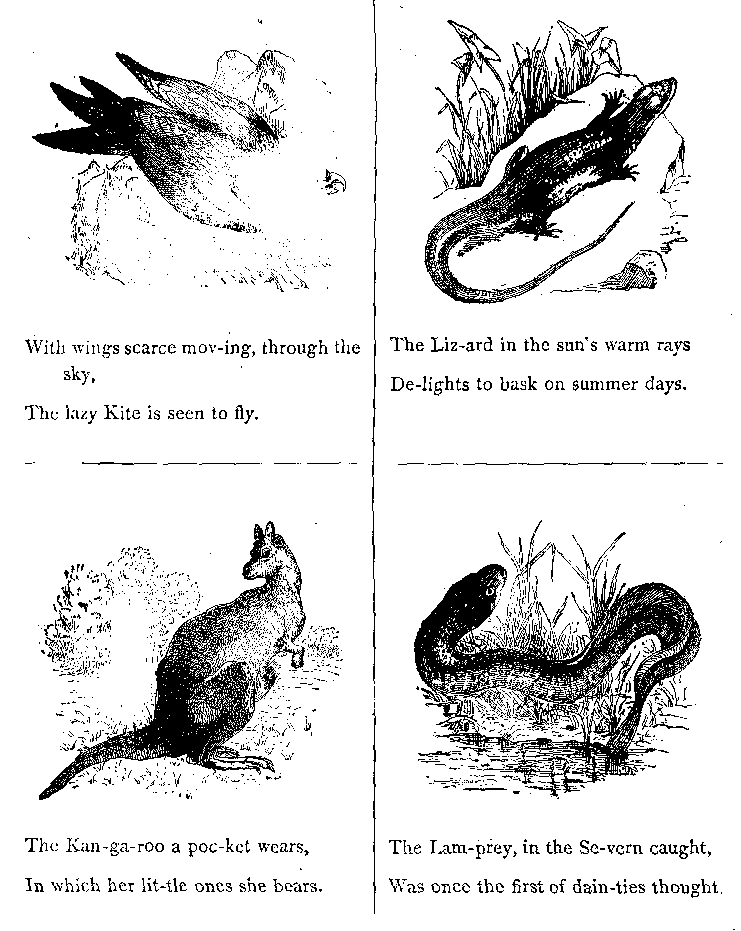


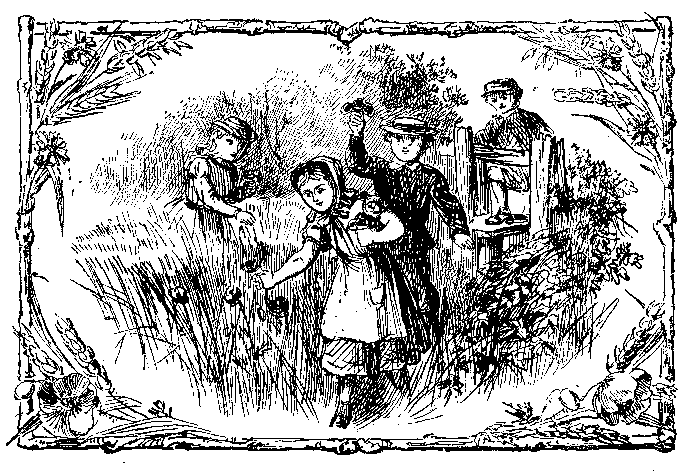
|
Through the corn the chil-dren creep, Where the nod-ding pop-pies sleep, Fill-ing hands and a-prons white With the scar-let blos-soms bright. Gau-dy pop-pies must not stay Till the fu-ture har-vest day: They would wi-ther when the heat Ri-pens all the gold-en wheat— Life for them is short and sweet. |
|
In our lit-tle boat to glide On the wa-ter blue and wide, While the sky is smooth and bright, What could give us more de-light? See the rip-ples, how they run, Twink-ling bright-ly in the sun; While re-flect-ed we can see Sha-dows of each hill and tree. See the li-lies, round and large, Float-ing near the reed-y marge, Where the bul-rush has its place And the hea-vy wa-ter-mace. See the great green dra-gon-fly, And the swal-low skim-ming by. See the fish-es spring and gleam, Ere they splash in-to the stream, See the bright king-fish-er too Dart a gleam of green and blue. These are all a-round our boat On the wa-ter whilst we float. |
|
Though in the corn that waves a-round Are thorns, and many hurt-ful weeds, That spring in e-ven good-ly ground And plant-ed thick with choic-est seeds; Though in our hearts, how-e-ver taught And trained to guard them-selves from sin, The good is mixed with evil thought Our en-e-my has sown there-in, God's plant-ing shall not be o'er-thrown By world-ly weeds that cling a-bout His corn; and what He hath not sown Shall in His time be root-ed out. Then, that our lives may yield their fruit, Still let it be our con-stant prayer, That God from out our hearts will root All seeds He hath not plant-ed there. |

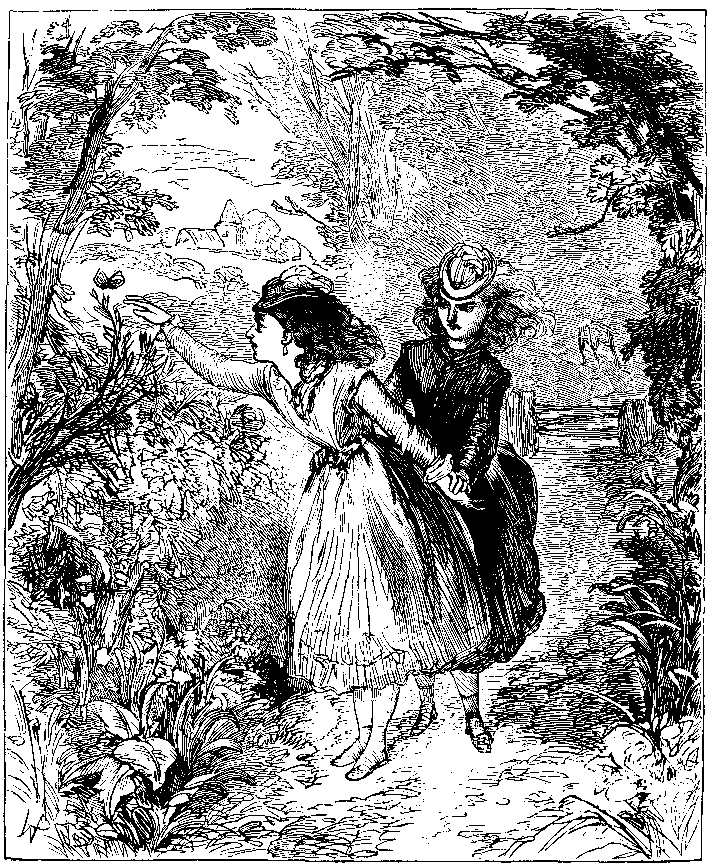
|
A yel-low But-ter-fly one day, Grown tired of play and tired of fly-ing, Up-on a this-tle blos-som grey With out-spread wings was i-dly ly-ing. The stur-dy bees went hum-ming by, Draw-ing sweet ho-ney from the clo-ver, Nor stir-red the yel-low But-ter-fly, For he was but an i-dle ro-ver. Two lit-tle girls, named Anne and May, Came by with mirth and laugh-ter ring-ing, Anne ran to seize the in-sect gay— May fol-low-ed fast and ceased her sing-ing. "Oh! dar-ling An-nie, let it be, Your touch will rob its plumes of beau-ty; And God, who made both you and me, Has taught us kind-ness is a du-ty." |
|
"You big black dog, go, go a-way! I will not let you bite My lit-tle pet; it can-not play, You gave it such a fright! "I think you want to eat it up Be-cause it is so small, But if you dare to touch my pup For help I mean to call; "And then pa-pa will bring a stick, And make you run a-way; So, Ro-ver, you had best go quick, And leave us here to play!" Why, Ro-ver, is quite good and tame— You need not be a-fraid; He on-ly wants to have a game, You sil-ly lit-tle maid! |
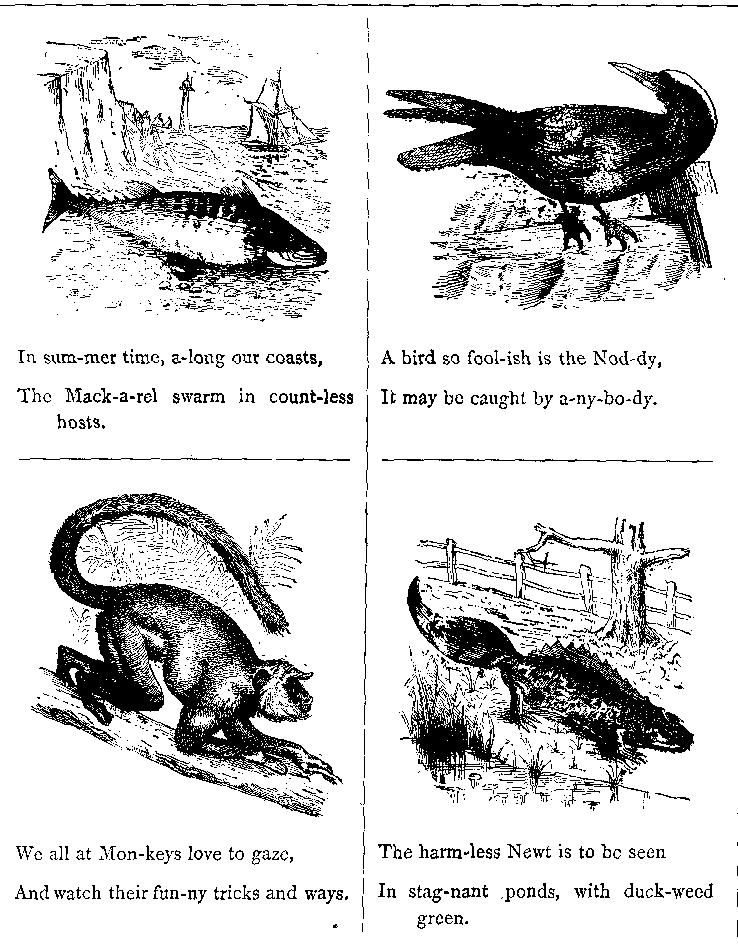


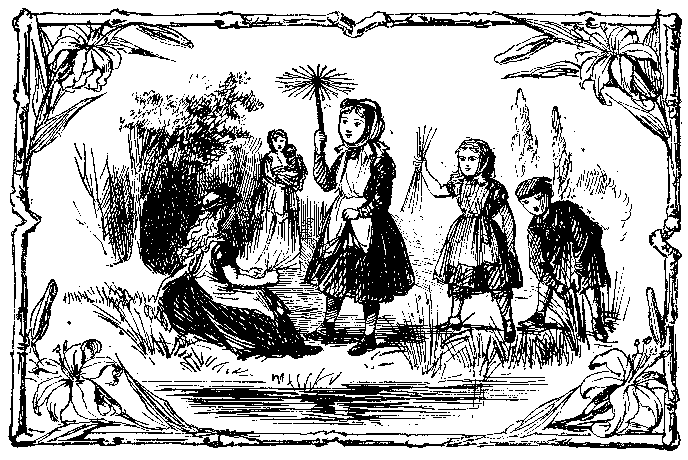
|
"Oh, come to the brook, sis-ter Kate, Oh, come with me, Het-ty and Gus, Where rush-es, so long and so straight, Are grow-ing in thou-sands for us!" Thus cries, to the rest, lit-tle May; And off to the mea-dow go all— For nurse has just shown her the way Of mak-ing a rush pa-ra-sol. |
|
The day was fine, the sun was hot, So Lu-cy took her pail and spade, And went to find a nice dry spot Where wells and cas-tles might be made. But all the shore just then was wet, So Lu-cy took off shoes and socks; She knew that nurse would fume and fret If they got spoilt by sand or rocks. But Ar-thur was so strong and big, He thought that he was quite a man, And he, in boots, would stand and dig, Which proved a very fool-ish plan. For soon his boots got wet and cold, And hurt his feet, and made him cry; He had to sit and hear nurse scold, While both his boots were put to dry. |
|
The seed was sown long months a-go, And, through the win-ter's cold and snow, We trust-ed that God's care would bring The green and ten-der blade in spring, Which che-rished by the sun and rain Of sum-mer, now has yield-ed grain In au-tumn, when the reap-er leaves His cot to cut and bind the sheaves, And load with them the nod-ding wain Which bears them home-ward from the plain. So God's great mer-cies thus a-bound; His love still brings the sea-sons round; His bless-ings fill our hap-py fields, And all our land its in-crease yields: So if we serve Him as we should, Our Lord will give us all things good; And He who doth the ra-vens feed Much more will give us all we need! |
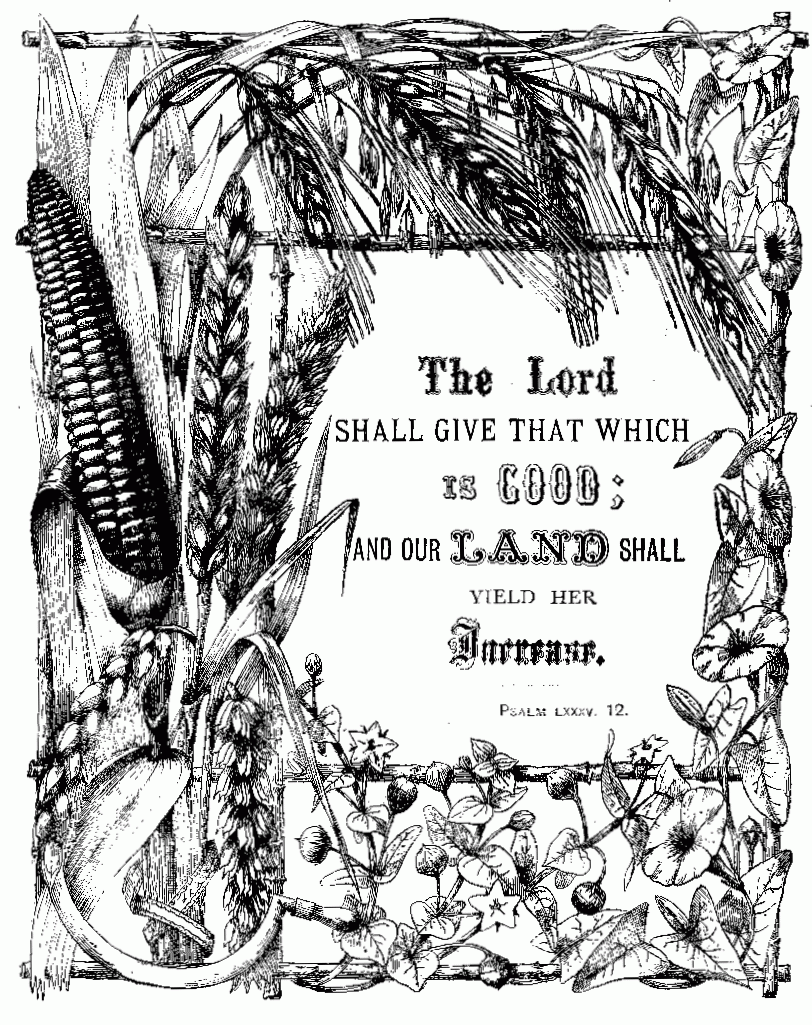
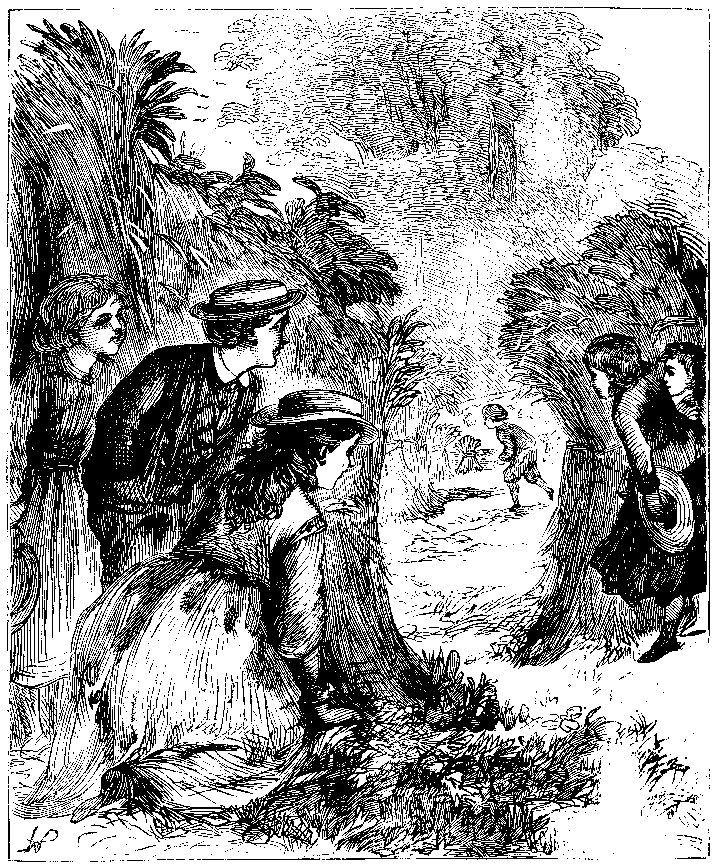
|
Oh, who could there be More mer-ry than we, On this bright har-vest morn. As we fro-lic and play, While we hide a-way, A-mong the sheaves of corn? We may fro-lic still Wher-e-ver we will, But yet we must not tread To waste with our feet The grains of the wheat— The wheat that makes our bread. For God, as we need, Gives the corn to feed And make us well and strong; And to waste in vain His gift of the grain Would grieve Him, and be wrong. |
|
Oh, tell me if e-ver you knew A teach-er who looked so se-vere As sis-ter Ma-ri-a can do, When les-sons she's go-ing to hear? Just look how she holds up her cane And frowns, as she threat-ens each one! But yet they'll not cry or com-plain, Be-cause it is only in fun. The dunce's cap Dol-ly must wear, Her task was not learnt very well; And now lit-tle Jane, I de-clare, Pre-tends she's un-a-ble to spell. Yet sis-ter may hold up her cane, And though they'll look so-lemn, each one, From laugh-ter they scarce can re-frain. Be-cause it is only in fun. |
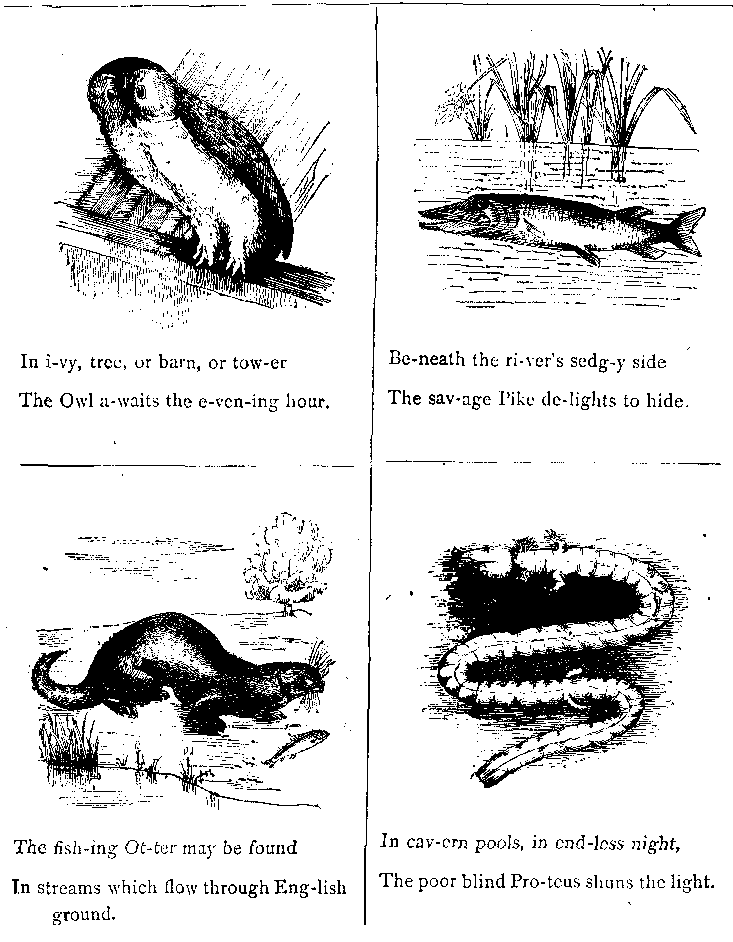


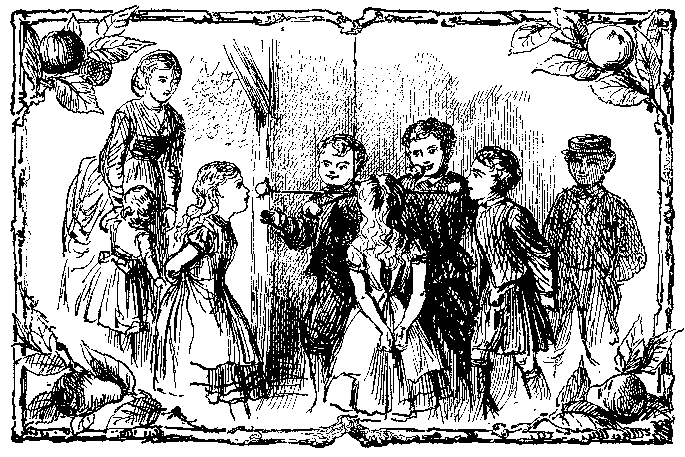
|
"Come, while it spins round, try your luck; Come, E-thel, and Kate, and your bro-thers! On two ends two ap-ples are stuck, And an on-ion on each of the o-thers. Be ready, and snap as they pass, Be quick, if you mean to be right, Or not the sweet ap-ples, a-las! 'Twill be, but the on-ions, you'll bite." |
|
Through the long day the cows are seen All graz-ing as they go, Wan-der-ing a-long the mea-dows green Where yel-low hawk-weeds grow. But when the clock with-in the tower Strikes five, they al-ways pace Slow-ly—for well they know the hour— Home to the milk-ing place. Then in the yard quite still they stand, Swing-ing their la-zy tails, Where Ann and Su-san are at hand With stools and milk-ing pails I love to see the white milk flow, And in the pail froth up; And Ann, who is so kind, I know, Will let me fill my cup. |
|
'Tis au-tumn now; the corn is cut, But o-ther gifts for us are spread, The pur-ple plum, the ripe brown nut, And pears and ap-ples, streaked with red, A-mong the dark-green branch-es shine, Or on the grass be-neath them fall; While full green clus-ters deck the vine That trails o'er trel-lis, roof, and wall. In our dear land the la-den trees Be-speak God's pro-vi-dence and love; He sends all need-ful gifts like these For those who trust in Him a-bove. How good is He to make such choice Of plea-sant fruits for us to grow! 'Tis meet, in-deed, that we re-joice In Him who loves His chil-dren so. |
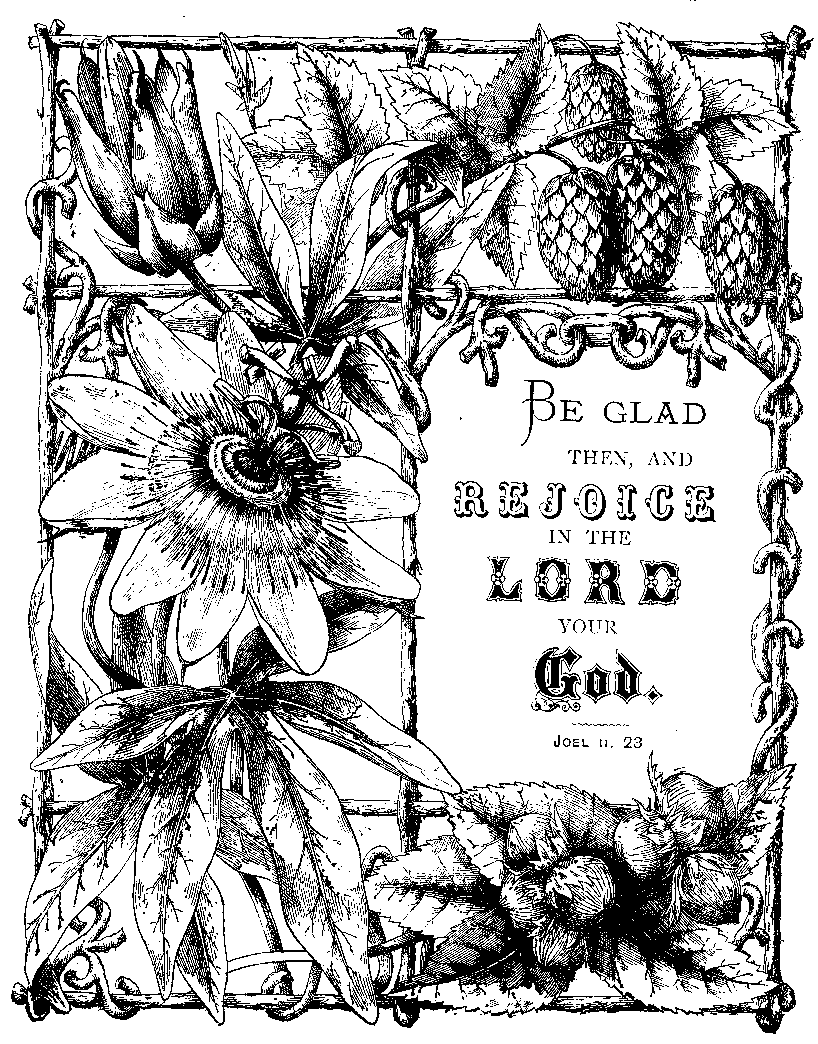
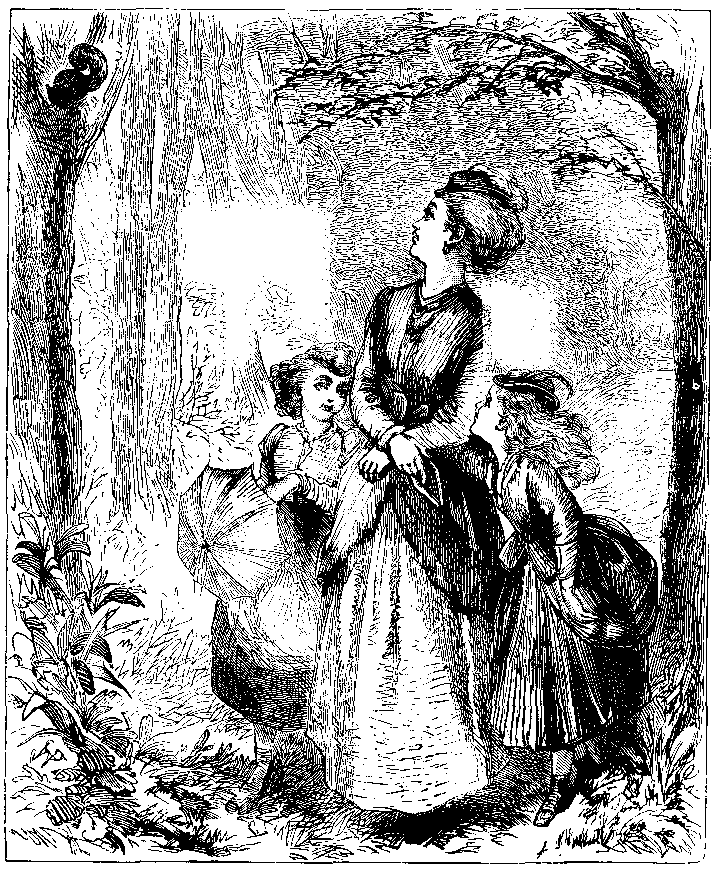
|
"Squir-rel, squir-rel, brown and brisk, High a-bove me in the tree, I can see you bound and frisk, I can see you peep at me. "Squir-rel, squir-rel, you can play; Mer-rier beast is none than you; Yet you are not only gay, You are wise and mer-ry too. You can play till sum-mer's o'er, And the nuts come fall-ing free, Then to hoard your win-ter store You are busy as a bee. "Squir-rel, squir-rel, I would bound Gai-ly at my sports as you, And, like you, I would be found Care-ful for the fu-ture too." |
|
Both Tom and Will had e-qual skill In mak-ing lit-tle boats and ships; They cut a-way a whole half day, And co-vered all the floor with chips. And when the boys had made their toys, They thought to put them to the test— To try which boat, when set a-float, Would sail a-cross a tub the best. But Will and Tom, each blow-ing from A dif-fe-rent side, you well may guess, No boats could go straight on, and so They tacked a-bout in great dis-tress. Such heavy gales a-gainst their sails Made both the boats go whirl-ing round; The sails got wet, the boats up-set, And all the crew on board were drowned. |
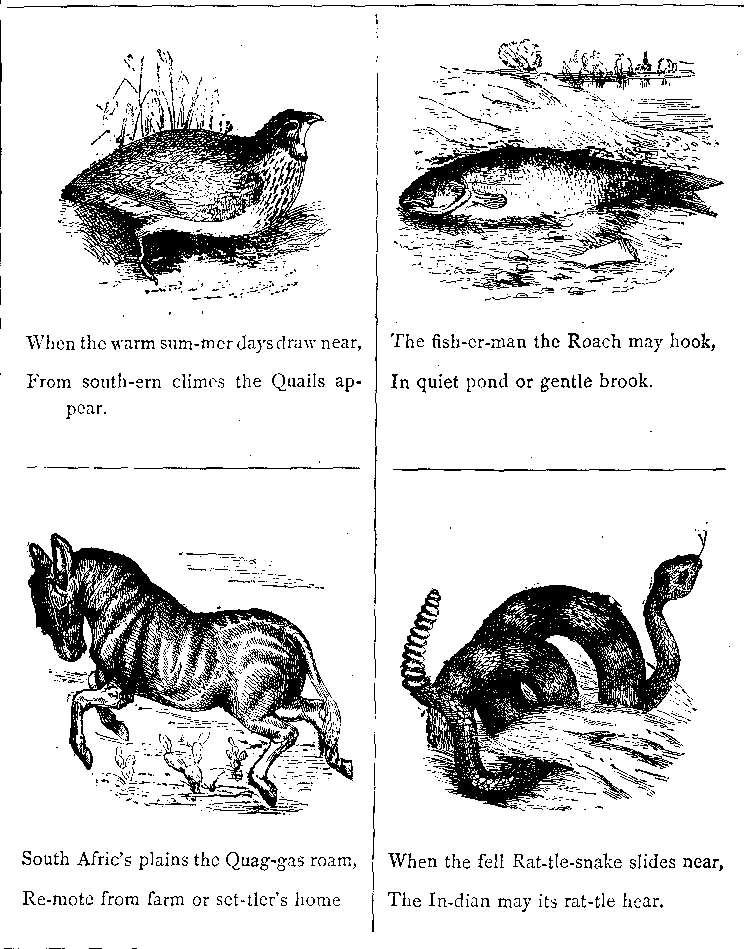

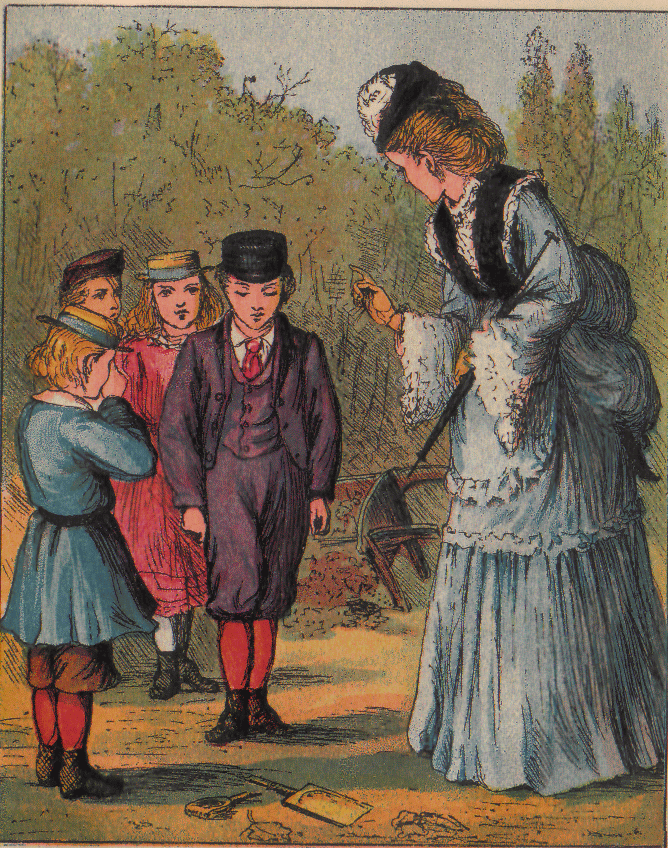
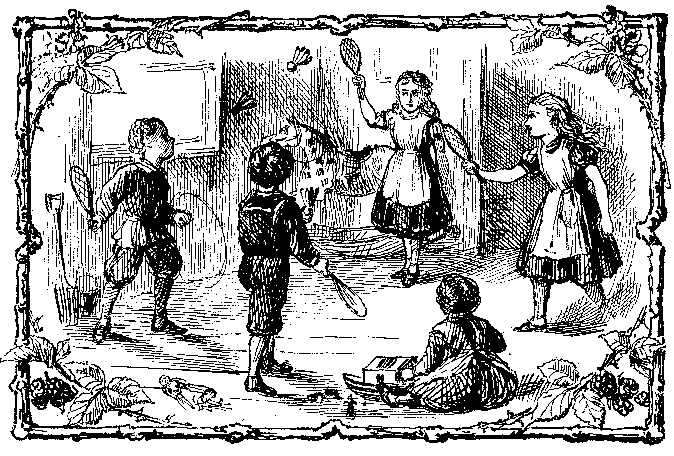
|
See these mer-ry chil-dren four, Now their les-son time is o'er, Deal-ing with the bat-tle-dore Steady blow on blow; Till the fea-thered shut-tle-cocks Fly at their al-ter-nate knocks, "Re-gu-lar as kitch-en clocks," Spin-ning to and fro. |

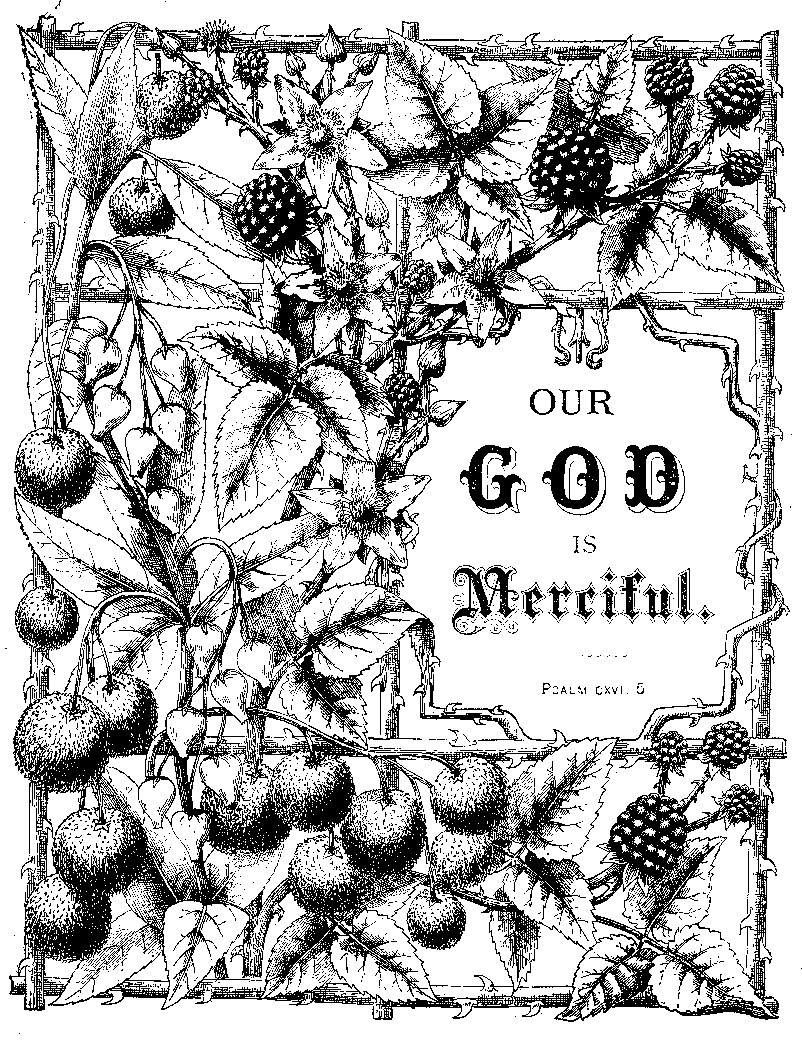
|
See where the spread-ing beech has made Be-neath its boughs a plea-sant shade To screen them from the sun; There George, and Anne, and Ma-ry play, Or read up-on each sun-ny day, When all their tasks are done. George has pulled out his knife, you see, And on the smooth-barked beech-en tree Has some-thing found to do; He's carv-ing deep, and plain, and well The let-ters, one by one, which spell His name and An-nie's too. His sis-ter An-nie, stand-ing by, Is watch-ing with a cu-ri-ous eye, And won-der-ing at his skill. To men and wo-men when they grow, They'll come and find the beech tree show Those names quite plain-ly still. |
|
"See how it rains! We can-not go Our walk a-cross the fields; and so, Since Tom and Et-tie Holmes are come, And cous-in Fred has brought his drum, And some can sing, and o-thers play, We'll have a con-cert here to-day. You, Tom, must in the mid-dle stand, And mark the time, with stick in hand; You, bro-ther Ben, the tongs must take, For they will good tri-an-gles make; Hal clicks the 'bones,' and Em-me-line Will beat her lit-tle tam-bour-ine, And cous-in Fred will drum a-way, And Kate the con-cer-ti-na play. All must at-tend to Tom; and mind None play too fast, nor lag be-hind; And then, I'm sure, we all shall see How grand a con-cert this will be, And say this is the wis-est way To spend this wet Oc-to-ber day." |
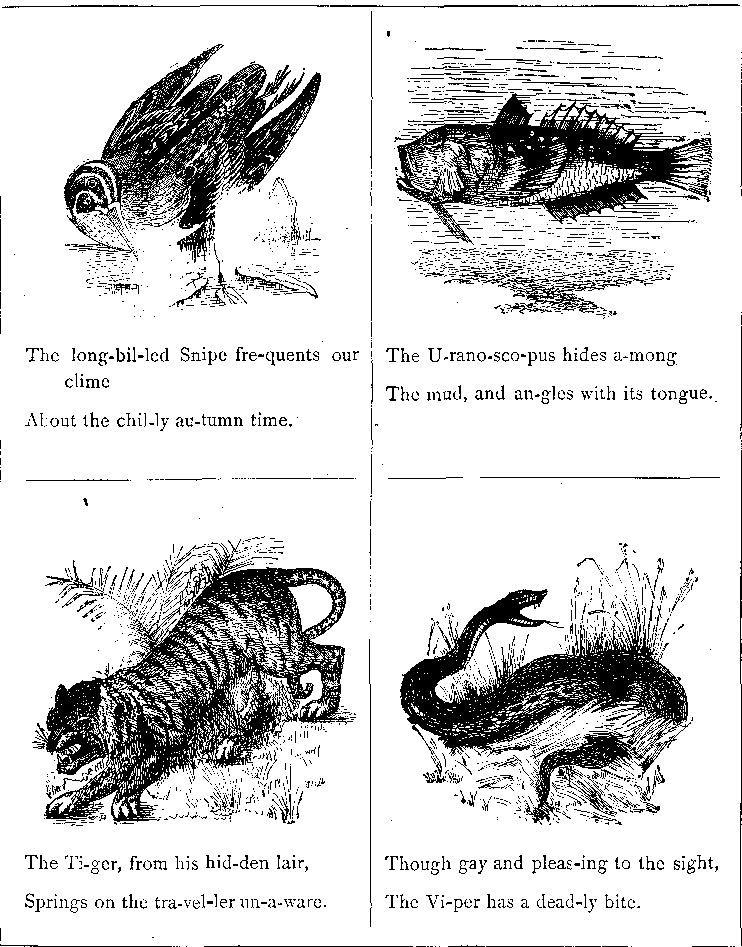



|
An In-di-an tem-ple on the floor The chil-dren build with wood-en bricks, They've placed two pil-lars by the door, And on the roof they now would fix A good tall spire, so Et-ty takes A long-er brick, and sets it there; And though when-e'er we walk it shakes, It will not tum-ble, I de-clare! |
|
Anne and Jane will long re-mem-her How, one morn-ing in No-vem-ber, As they both were home-ward stroll-ing, Round the Lon-don fog came roll-ing— First, a yel-low dark-ness fall-ing, Then a noise of link-boys call-ing, Cab, and 'bus, and cart-wheels rum-bling, Hor-ses on the pave-ment stum-bling, Peo-ple, in the smoke and smo-ther, Run-ning up a-gainst each other, No one see-ing, much less know-ing, Whi-ther he or she was go-ing. Little Jane clung to her sis-ter, While Anne com-fort-ed and kissed her, For the girls felt bro-ken-heart-ed, Fear-ing lest they should be part-ed. So they were when Char-lie found them, Lost a-mid the crowd a-round them, But so glad when they es-pied him, And came trip-ping home beside him. |
|
Our God who reign-est up on high, Though light-nings flash a-cross the sky, And howl-ing tem-pests hur-ry by, We fear not these, for Thou art nigh To all who trust in Thee. Though now the sky is o-ver-cast, And hea-vy rains are fall-ing fast, And storm and sleet go driv-ing past, And day by day the moan-ing blast Sweeps dead leaves from the tree, No-vem-ber time, that seems so drear, When days are dark and win-ter near, Will pass at length, and Christ-mas cheer The last hours of the dy-ing year With song and dance and mirth. And in due time Thy mighty pow-er Will give the spring, with sun and shower, The o-pen-ing leaf, the ear-ly flow-er, And birds in e-ve-ry wood-land bow-er Will sing to glad-den earth. |

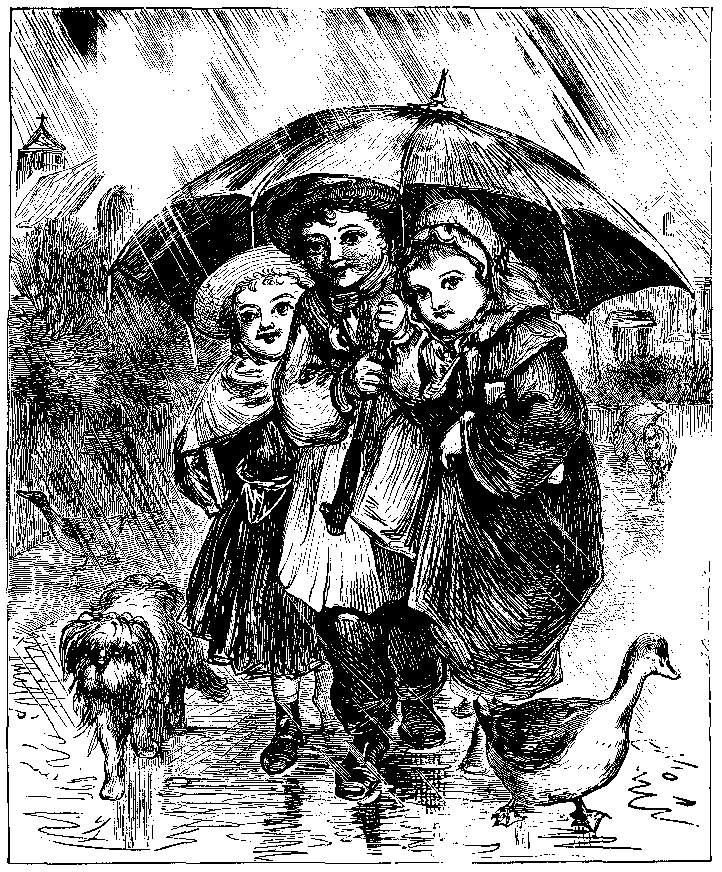
|
Come, Meg and El-len, don't com-plain, For, see, the geese en-joy the rain, And dog-gie docs not fret; And yet, The drops come rol-ling down his ears, And nose, and whisk-ers, just like tears; Poor Mop, he's drip-ping wet! Our big um-brel-la co-vers three, And snug and dry we all may be, And chat-ter as we go, And show The grumb-ling peo-ple whom we meet That nei-ther wind, nor driv-ing sleet, Can spoil our tem-pers.—No, We will not take such days as this, Nor any-thing God sends, a-miss, But what we can-not cure Endure; And this will prove a Gold-en Rule To prac-tise as we walk from school— Of that we may be sure. |
|
One day when Lil-lie saw her cat Sit down and lick a kit-ten's face; "No, puss," said she, "don't wash like that— My bath will be the pro-per place. "I'll show you how to wash them, puss." So in she dipped them one by one; Poor Min-nie mewed and made a fuss, But Lil-lie only thought it fun. Puss feared her lit-tle kits would drown, And did her best to get them out; While Lil-lie dipped them up and down, And splashed the wa-ter all a-bout. Till nurse came up and saw the mess, Took out the kit-tens, and instead Made thought-less Lil-lie quite un-dress, And have her bath and go to bed. |
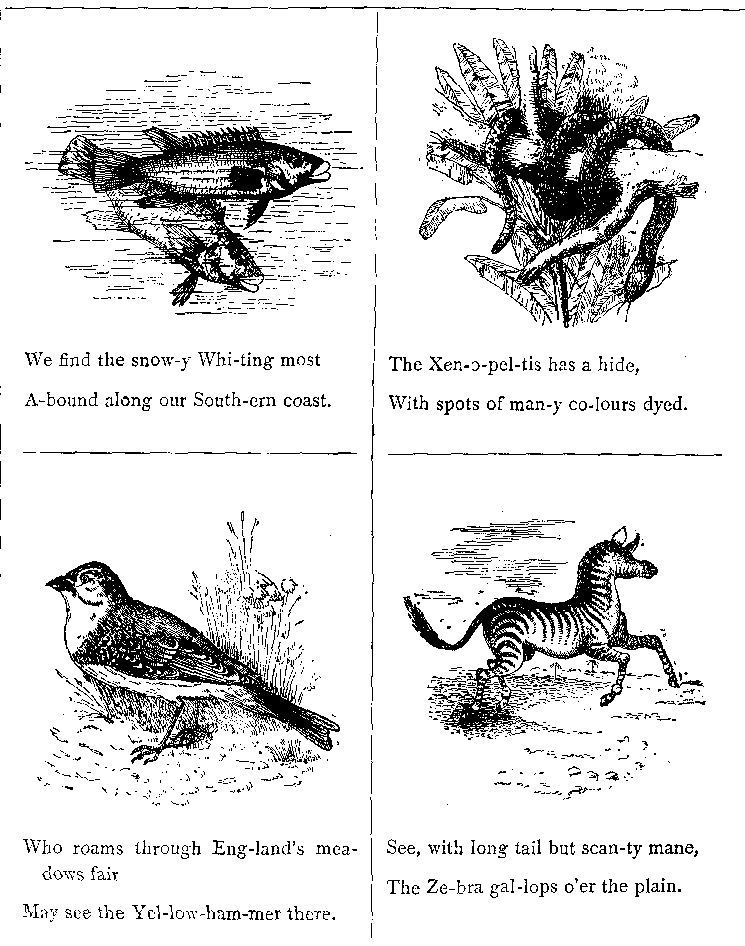

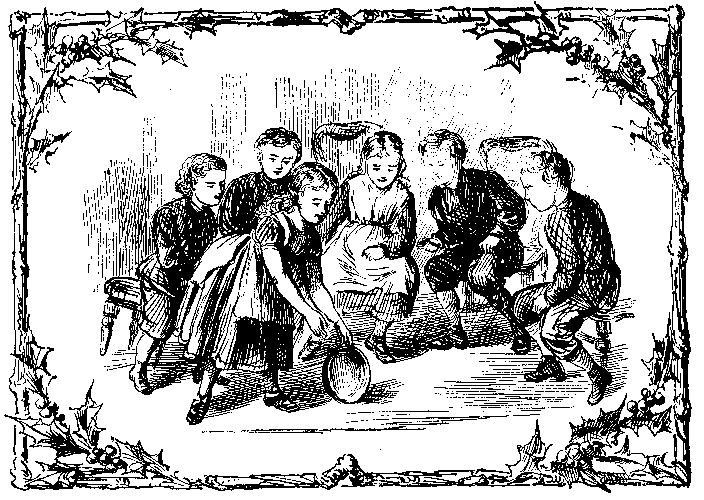
|
If, at this old Christ-mas game, Kate, who spins the trench-er, call Any play-er out by name, He must catch it ere it fall. If "Move all" she should re-peat, All sit still; but if she say "Twi-light," each must change his seat, Or a for-feit he must pay. |
|
The East-ern sages watched the sky, They looked from night till morn, There shone a bright, new star on high, They knew that Christ was born. Then up they rose, and came from far, They jour-neyed night and day, Led by the shin-ing of that star, And found Him where He lay. There is not any need for us To leave our homes be-hind, Through dis-tant lands to tra-vel thus The Son of God to find. For home to us each Christ-mas Day The new-born Sa-vi-our brings; Then shall we not our hom-age pay Like those good East-ern kings? |